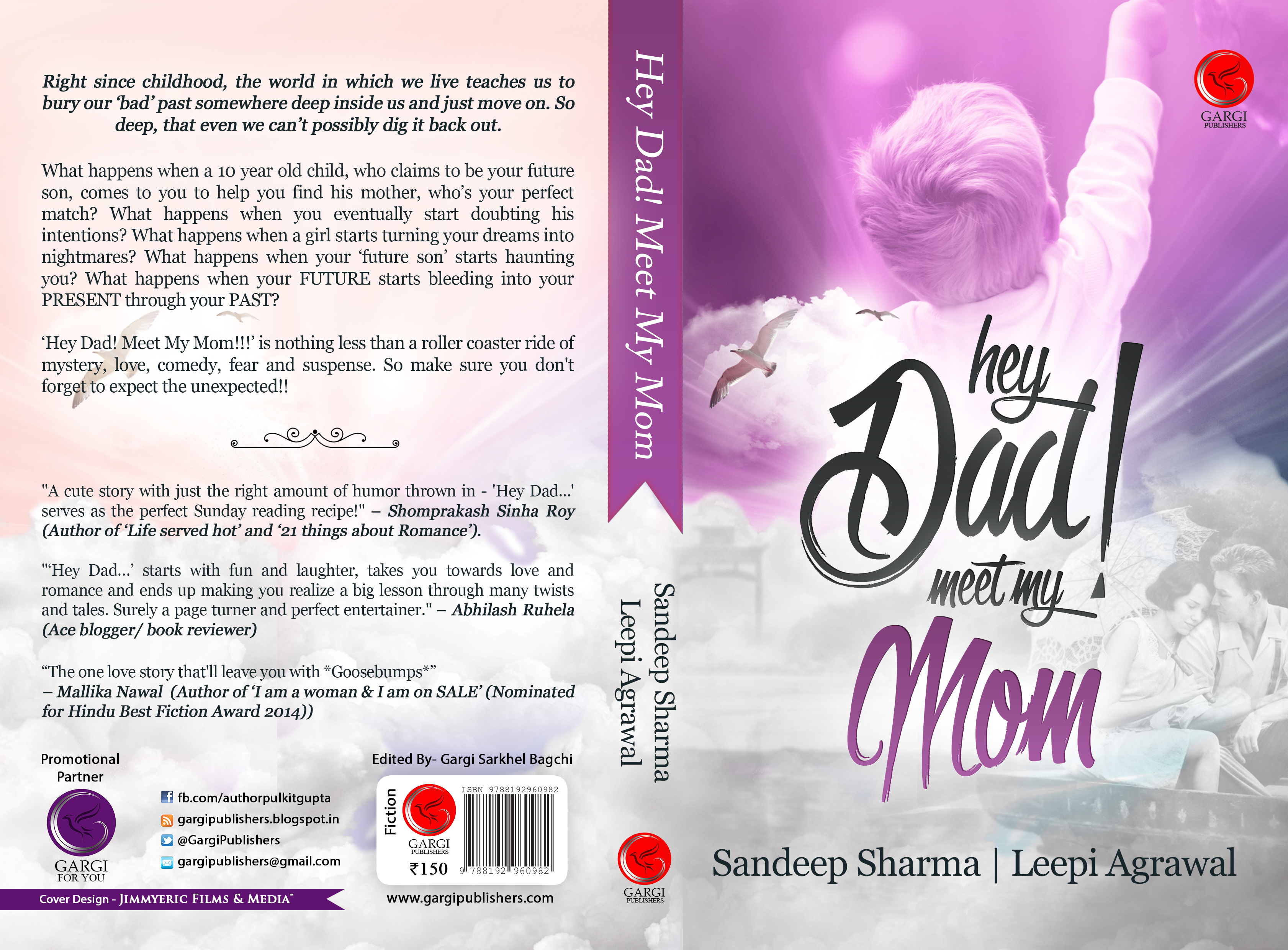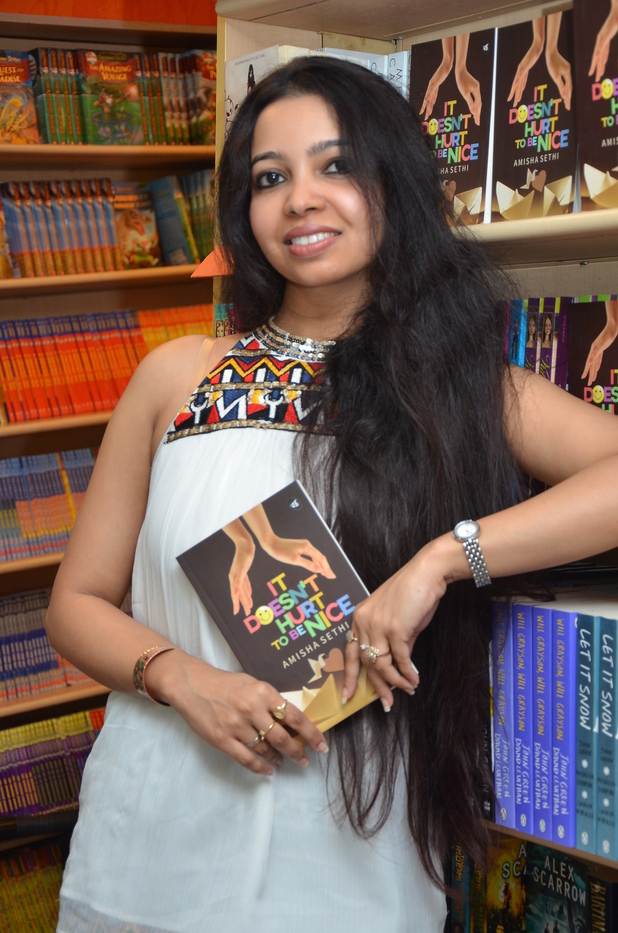Day: 1222
Blog post: - 127
Book Review: 11
I am back with the book review of ‘Hey Dad! Meet My Mom…’ (HDM3) by Sandeep Sharma and Leepi Agrawal. This is the second book by Gargi Publishers which I have read and sharing my review here. My first book review of Gargi’s book was about ‘Hidden Husband’ by Shikha Kaul; which was highly appreciated by everyone and read by over 30.5k unique visitors till today. After reading ‘Hidden Husband’ and HDM3, I have become a fan of Gargi publishers’ books now. And one more book from the same publisher is on my bookshelf and that is ‘Her Resurrection’ by Soumyadeep Koley. Actually, HDM3 had been looking at me to be read and get reviewed for long days from my bookshelf. I am regretting not reading this book early. Now let me come to the detailed analysis of Hey Dad! Meet My Mom…
 (Book Cover of HDM3 | ©Wordpress)
(Book Cover of HDM3 | ©Wordpress)
BOOK COVER: A boy’s image while looking backward raising a hand seems like he is calling his dad. The couple is sat in a boat beside the boy. Flying birds indicate the scene of dawn. An umbrella in a girl’s hand indicates rainy season. Monument in the cover shows that cemetery place is near somewhere. Title 'Hey Dad! Meet My Mom' perfectly suits to the book cover and plot. I would give 5 of 5 to Jimmyeric Films & Media for the cover design of HDM3.
FICTITIOUS CHARACTERS:-
- Puneet Shrivastava: Authors portray Puneet Shrivastava as a protagonist in HDM3. He is the narrator of the story.
- Rishi: Authors portray Rishi as the second main character in HDM3. He is a boy of 10 years age.
- Roshni Bhatt (Rosh): Rosh is a dream girl of Puneet.
- Mrs. Bina Shrivastava: Authors sketch Bina’s character as the typical mother of Puneet. I am sure that readers would relate their own mother with her character.
- Mr. Rajiv Shrivastava: Rajiv is the name of Bina’s late husband and Puneet’s father.
- Dr. Sharad Taneja: Dr. Sharad is Puneet’s uncle and he works as a psychiatrist in his clinic.
- Maya: She is the owner of her coffee shop.
- She: She is the mysterious character. You should read the book to know about her.
- Myra: Authors portray Myra as Puneet’s girlfriend.
- Mrs. Martha: Puneet’s house owner in Ahmedabad.
- Ashish: A bachelor of third year engineering and Puneet’s roommate in Ahmedabad
- Yash Agrawal: Puneet’s senior in Computer science engineering and a roommate in Ahmedabad.
- Umesh: Puneet’s roommate in Engineering in Ahmedabad. Authors portray his character as a complete girls’ database. Hehehe!!!
- John: Authors portray John as a friend of Puneet’s seniors who has 6 abs with an impressive physique.
- Rahul: Authors portray Rahul’s character as a Puneet’s senior. He represents guys in institutions who follow senior attitude.
- Taxi Driver: Authors give a glimpse of a taxi driver in Ahmedabad whose presence is really short in the story, but he represents whole community of his occupation in big cities like Ahmedabad.
- Baba: Authors portray Baba as an exorcist.
- Adi, Riya and Kiara: Authors portray their characters as secret in Rosh’s life. Kiara’s name reminds me the central character of 'It Doesn’t Hurt To Be Nice' by Amisha Sethi though there does not exist any kind of relation in between both books.
SETTING: - The story of HDM3 is narrated into 22 short chapters. Authors use present tense to narrate the story and flashback scenes are narrated as usual in past tense. Regional words are printed in italic fonts. Short chapters increase the curiosity to finish the book in one go.
LOCATIONS: - The story of HDM3 runs around several locations like Puneet’s house, Maya’s coffee shop, Myra’s PG house & Dr. Sharad’s clinic from Delhi and St. Xavier’s College Ahmedabad & Kalapur railway Station from Gujarat.
LANGUAGE & WRITING STYLE: Authors scribble the story in simple language and narrative style. Use of capital letters to stress on words and italic fonts for regional words make the book interesting.
INTERESTING FEATURE:

(©First page of HDM3)
Every chapter of HDM3 begins with the shadow image of a married family (introduced on the first page) and ends with a graphic image of a little boy.
PLOT and SUMMARY: - ‘Hey Dad! Meet My Mom!!!’ begins with a comic conversation. The story is based on Puneet’s daydreaming and nightmares but authors cover so many genres within 157 pages only. Authors don’t stretch the story so every single page becomes worth reading and entertaining. Rishi’s appearance in Puneet’s life commemorates ‘chemical locha’ in the Bollywood movie ‘Lage Raho Munnabhai’ where Munna (Sanjay Dutt) could see Mahatma Gandhi (Dilip Prabhavalkar). Rishi’s character relates a character of the Karna in the novel 'Karna’s Alter Ego' by Surendra Nath Mohanty Ji in which Karna appears in protagonist Vasu’s dreams. Authors refer a quotation from the Mahabharata- “Jurm karne se bada paap jurm sehna hota hai.” Authors inform about Laughing Buddha as “Laughing Buddha is a Feng Shui article. It’s the indicator of good luck or good charm. And there’s a saying that, if you wish for something while touching the stomach of this idol, your wish will get fulfilled soon.” The suspense keeps unrevealed until the end so the book becomes interesting. The twenty-first chapter is one my favorites. A poem ‘Hey Dad! Meet My Mom!!’ by Payal Srivastava is just like a cherry on the cake.
The first interaction between Puneet and Rosh is described wonderfully. Date scene in ninth chapter is scribbled sweetly so reader feels that the scene should never end!!! Romance and intimate scenes are scribbled beautifully. Authors indirectly comment on mantras in a satiric manner. Authors comment on superstitions in Indian society through the protagonist’s observation. Puneet’s Sarcastic comment on spelling mistakes, hot seat, and boring songs in barber’s shop show deep observation of saloon by authors. The one name written in my diary was commemorated while reading about Roshni’s diary as the scene does relate to my own life- “I never shared my dream with anyone, as I even felt afraid to share it with myself. The only one who knew about it was ‘My Diary.’” Authors comment on flirt as “You know I have heard or maybe read somewhere that boys think that flirting with girls seems to be cool and girls like that but frankly speaking most girls don’t like this flirty nature of boys.”
Authors sketch a realistic picture of local vegetable markets in India, bargaining skills of Indian housewives like Mrs. Bina Shrivastava make readers laugh. They sarcastically remark readers’ attention on the dark reality of love birds’ shameful activities in public places like parks. Puneet’s past takes us in flashback and commemorates the college days. They narrate the realistic picture of juniors’ torture and ragging by seniors in colleges, and warn the seniors- “Look, if you are trying to rag me then listen everyone, it’s an offence and if any faculty sees you, you’ll have to undergo serious punishment, and if I report your act to the police, you can’t even imagine what will happen to you, your entire career will be spoiled.” Authors comment on parents’ and society’s refusal for love. They comment on addicted persons in an ironic way- “For a smoker and a drinker, there are only two occasions when they smoke or drink; one, when it rains and the other when it doesn’t.” While reading about coma, it seems that authors would research a lot about this unconscious state of mind; I would like to note some extracts about this state from the book- “Coma, as you may know, is a kind of sleep which usually occurs because of some kind of a trauma. Now, when we sleep, usually our last thought gets trapped in our mind and reaches our unconscious mind which slowly gets jumbled with our memories and produces a weird kind of a dream. We all experience this.” “In the same manner, a state of coma also traps our last wish, memory or thought and produces dreams when we are sleeping deep in coma.” “But there is one strong difference between coma and a normal sleep and that is the activeness of our unconscious mind.”
FAVOURITE QUOTES FROM THE BOOK:-
- “Time is pretty strange concept actually. When you waited for it, it seemed to stand still and when you wanted it to stay, it flew away quickly.”
- “People very correctly say that love makes you do things, you’ve never done before.”
- “Don’t follow the crowd, follow your heart because the crowd may lead you to your destination but your heart will surely lead you to happiness.”
- “Before falling in love I had always wondered, what were the topics that lovers could talk about for so long at all odd hours of the day but now I realized that the topics didn’t matter, what mattered was the feeling that on the other side of your phone, there lay someone who was dying to stay with you; who was missing you terribly, just to get a glimpse of you, to touch you and feel the happiness of heaven, to realize that love is truly beautiful.”
- “Life is nothing but a place to enjoy the feeling called love. When you are in love, there’s nothing right and there’s nothing wrong, there’s just one thing and that is love itself.”
DRAWBACKS: - Though there are not too much printing errors in the book, I found two typing errors in it- ‘of which’ is repeated on page 33 and Dr. Sharad Taneja’s surname ‘Taneja’ is written incorrectly as ‘Ahuja’ on page no. 85. Though Rs. 150 are not too much, I think the price of the book is a bit expensive. I know the strategy behind prices of books but I think it would be much better if HDM3 would be available in between Rs. 100 and Rs. 120.
REVIEWER’S VERDICT:-

(©Rajesh D. Hajare | Facebook)
‘Hey Dad! Meet My Mom…’ by Sandeep Sharma and Leepi Agrawal is the combo of realistic and unrealistic theme filled with fun, comedy, motivation, philosophy, love, romance, emotions, fear, mystery, suspense and all that stuff need to be a perfect entertainer. The book does not let you put down and suspense increases curiosity to know an unexpected climax. I won’t hesitate to recommend HDM3 to my readers.”
MY RATING:-
I would give 4.4 out of 5 stars to the book ‘Hey Dad! Meet My Mom…’ by Sandeep Sharma and Leepi Agrawal.
OVERVIEW OF HDM3
Right since childhood, the world in which we live teaches us to bury our ‘bad’ past somewhere deep inside us and just move on. So deep, that even we can’t possibly dig it back out.
What happens when a 10 year old child, who claims to be your future son, comes to you to help you find his mother, who’s your perfect match? What happens when a girl starts turning your dreams into nightmares? What happens when your ‘future son’ starts haunting you? What happens when your FUTURE starts bleeding into your PRESENT through your PAST?
‘Hey Dad! Meet My Mom!!!” is nothing less than a roller coaster ride of mystery, love, comedy, fear and suspense. So make sure you don’t forget to expect the unexpected!!
(Watch this amazing book trailer of HDM3 on Youtube (©The Authors Blog))
PRAISES ON HDM3 :-
“A cute story with just the right amount of humor thrown in – ‘Hey Dad…’ serves as the perfect Sunday reading recipe” –Shomprakash Sinha Roy (Author of ‘Life served hot’ and ’21 things about Romance’).
“‘Hey Dad…’ starts with fun and laughter, takes you towards love and romance and ends up making you realize a big lesson through many twists and tales. Surely a page turner and perfect entertainer.”– Abhilash Ruhela (Ace blogger/ book reviewer)
“The one love story that’ll leave you with Goosebumps”– Mallika Nawal (Author of ‘I am a woman & I am on SALE’ (Nominated for Hindu Best Fiction Award 2014))
ABOUT THE AUTHOR (Sandeep Sharma):-

(©Author Sandeep Sharma (Facebook)| PC: Tushti Bhatia)
Sandeep Sharma, a dreamer from Agra, the city of love and the Taj Mahal, is currently in his final year pursuing B.Tech (Civil Engineering) from JSS Academy of Technical Education, Noida.
He is very passionate about writing and has been writing short stories for a personal blog since 5 years. He has also co-founded ‘The Author’s Blog’ which is a kind of a platform which tries to bridge the gap between authors and readers. He is an avid reader and loves to review books on his blog.
He has been previously associated with many anthologies as a contributing author.
Sandeep Sharma loves to spend most of his time with his parents. According to him, “Parents always have so much to teach, it’s just a matter of your learning desire and time.”
ABOUT THE AUTHOR (Leepi Agrawal):-

(©Authoress Leepi Agrawal | Facebook)
It is said that books are a person’s best friend, so Leepi Agrawal started spending her with this special friend who then led her to write stories and poems at an early age. The Times of India gave wing to her writing by publishing her works in their esteemed newspaper.
Leepi is an “Ahmadavadi Chokri” filled with zest and always strives to mark her work with perfection.
She is a final year student and a gold medalist for her academic excellence in Masters of Computer Applications at Indus University, Ahmedabad. She has won the TechFest in April 2014 at college and state level.
As writing is her passion, she loves to roam in the “gallis of Ahmedabad” so that she can explore more about her birthplace through writings. Apart from the previous successes of her short-stories, now even one of her poems has been acclaimed on an international platform.
She is quite obsessed with writing, wires and machines and subsequently her obsession has turned into her passion and profession.
Today is her birthday, so let’s wish her warm greetings on her birthday. I hope she would like this review as a small gift from her reader on her birthday!! Wishing her a very HAPPY BIRTHDAY..!!
A glance on HDM3:
- Title: HEY DAD! MEET MY MOM…
- Brief Title: HDM3
- Authors: Sandeep Sharma | Leepi Agrawal
- Publisher: Pulkit Gupta
- First published by Gargi Publishers (in January 2015)
- Edited by Gargi Sarkhel Bagchi (Facebook)
- Design and Typeset by Ajay Verma (Facebook)
- Cover Design by Jimmyeric Films & Media (Facebook)
- Copyright: ©Sandeep Sharma
- ISBN: 978-81-92960-98-2
- Genre: Fiction
- Pages: 164 (including cover)
- Price: Rs 150/- (incl. all taxes)
- Reviewer: ©Rajesh D. Hajare (RDH)
- My Rating:
(4.4 out of 5 stars. | Good)
HDM3 is Available on major online stores…

Amazon Paperback (4/5) | Amazon Kindle | Flipkart (4.2/5) | PayTM |
- Sandeep Sharma can be contacted through:
- Leepi Agrawal can be contacted through:
- Publishers can be contacted through:
Pulkit Gupta | Gargi Publishers | @GargiPublishers | Blog | Website
- Reviewer can be contacted through:
FB Profile | Official FB Page | Twitter | Goodreads | +917588887401 (WhatsApp)
Amazon Reviewer’s Ranking (#272272)
Disclaimer:
- Few quotes are mentioned in this review from the book HDM3 with the permission of one of the authors of the book Sandeep Sharma. Reviewer doesn’t claim to be a writer of quotes mentioned in this review.
- Review Copy of HDM3 was sent to the reviewer by an author Sandeep Sharma.
- This is not a paid review.
- This is my personal opinion and analysis of HDM3 and readers’ reviews may be different about the same book.
- Reviewer of this book works as the President of Gondia District at Akhil Bhartiya Marathi Sahitya Parishad, Pune.
My Review of Gargi’s book:
Hidden Husband by Shikha Kaul (Rating: 4.5/5, Visitors: #30600)
Related Reviews:
- Karna’s Alter Ego by Surendra Nath (Rating: 4.5/5, Visitors: #12240)
- It Doesn’t Hurt To Be Nice by Amisha Sethi (Rating: 4.15/5, Visitors: #4980)
- The Pocket Love Story by Ajitabha Bose (Rating: 4/5, Visitors: #9360)
Previous Review: Khel The Writings by Vishal Goswami (Rating: 3.25/5 Visitors: #2640)
Reviews coming soon…
- You Are The Best Wife by Ajay K Pandey (by 7th Feb)
- Without You by Preethi Venugopala (by 14th Feb)
Now Reading: Heart of Bullets by Nikhil Kushwaha
Books reading soon…
- #IAm16ICanRape by Kirtida Gautam
- Her Resurrection by Soumyadeep Koley
- Klass by Prita Yadav
- Unanswered by Kunal Uniyal
- Swachchhandi by Pranav Joshi
Unique Visitors Counter: #397056








